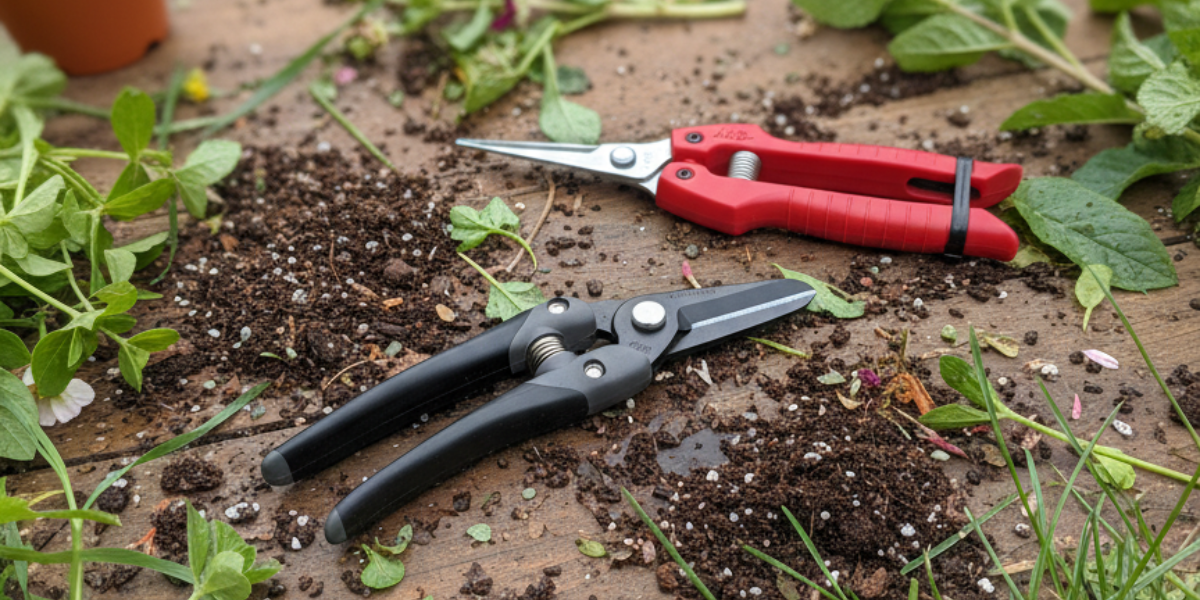Nothing beats the snip of a sharp, well-balanced pair of secateurs. Whether you’re dead-heading natives, shaping citrus or sliding into a jungle of tomatoes, the right tool makes every cut cleaner and every plant happier.
Quick picks
|
Need |
Top choice |
|
All-round shrub & fruit pruning |
Saboten 1255 Bypass Secateurs – high-carbon steel, Teflon-S coated, up to ≈ 20 mm cut |
|
Hard, woody stems |
Saboten 1257 Anvil Secateurs – one-strike power for dry branches |
|
Precision harvest & bonsai |
ARS 300L Needle-Nose Pruner – 46 mm pointed blades, 110 g feather-light |
|
Flower trimming / indoor grow rooms |
Saboten PT-6 Harvest Scissors – shock-absorbing grip for marathon snipping |
|
Starter bundle |
Explore the full Secateurs & Scissors range + Propagation Tools for cuttings and clones |
Types of Secateurs (and when to use them)
Bypass
Two curved blades glide past each other, giving a clean, living cut that heals fast. Perfect for roses, fruit trees and anything green and sappy.
Anvil
A single blade meets a flat “anvil” plate. Use it on dead or woody stems where a bit of crush doesn’t matter—think old grape vines or dry ornamental grasses.
Snips & scissors
Needle-nose or straight blades designed for speed and finesse—ideal for veggie harvesting, bonsai and indoor grow tents where space is tight.
Folding saws & knives
Technically not secateurs, but worth having for branches thicker than your thumb. Pair a folding saw with bypass secateurs and you’ll breeze through most backyard jobs.
How to Choose the Right Pair
-
Cutting capacity – Match the blade gap to the thickest stem you regularly tackle. The Saboten 1255’s 20 mm limit covers 95 % of home pruning.
-
Blade material & coating – High-carbon Japanese steel stays razor sharp; low-friction coatings (e.g., Teflon-S) shrug off sap
-
Ergonomics – Look for spring-loaded rebound and non-slip grips. If you’ve got smaller hands, the ARS 300L’s 110 g frame is bliss.
-
Maintenance access – Tools with a simple central bolt let you tighten, strip and sharpen in minutes.
-
Job frequency – Daily market-garden pickers might want two pairs: tough bypass secateurs and lightweight snips to save wrist strain.
Product Deep-Dive
Saboten 1255 Bypass Secateurs
Why it shines: High-carbon blades + Teflon-S coating = friction-free, rust-resistant performance. A thumb-lock keeps pockets safe and the spring rebounds smoothly between cuts.
Saboten 1257 Anvil Secateurs
For the gnarly stuff: The fixed anvil plate focuses force, letting you crunch through deadwood that would stall a bypass pair. Great back-up when rejuvenating old shrubs.
ARS 300L Needle-Nose Pruner
Precision king: 46 mm pointed blades slide into tight clusters of chillies or strawberries without nicking fruit. At just 110 g it’s also bonsai-friendly.
Saboten PT-6 Harvest Scissors
Trim for hours: A shock-absorbing urethane grip and blunt safety tip let you whip through herb harvests or dead-leaf clean-ups without wrist burn.
Tip: Keep a bottle of isopropyl alcohol on hand. A quick wipe between plants stops disease spread and keeps sap from gumming up the pivot.
Care & Maintenance in 4 Easy Steps
-
Clean – After each session, wipe blades with a dry cloth and a splash of alcohol.
-
Sharpen – Hone every 4–6 weeks; follow the factory bevel and finish with a light strop.
-
Oil – A drop of camellia or mineral oil prevents rust and keeps the spring silent.
-
Store – Hang indoors or in a dry shed. Humid Aussie summers can pit even premium steel if left outside.
Frequently Asked Questions
Q. How often should I sharpen my secateurs?
A monthly touch-up during peak pruning keeps the edge keen; heavy commercial users may sharpen weekly.
Q. Do I need different tools for natives vs exotics?
Mostly no—choose bypass for fresh growth and anvil for woody stems. The same pair covers grevilleas and citrus.
Q. What’s the best way to avoid hand fatigue?
Pick a tool that fits your palm width and has a cushioned spring. Lightweight snips like the ARS 300L help during long harvest runs.
Q. Can left-handers use these secateurs?
Yes. All four recommendations above have symmetrical grips; only the locking catch sits on the right side.
Final Cut
Quality secateurs are an investment you feel every time you walk into the garden: fewer crushed stems, faster plant recovery and happier wrists. Ready to upgrade?
Browse the full Secateurs & Scissors collection or grab our quick-pick heroes above and experience the difference a razor-sharp blade makes.
About the Author





